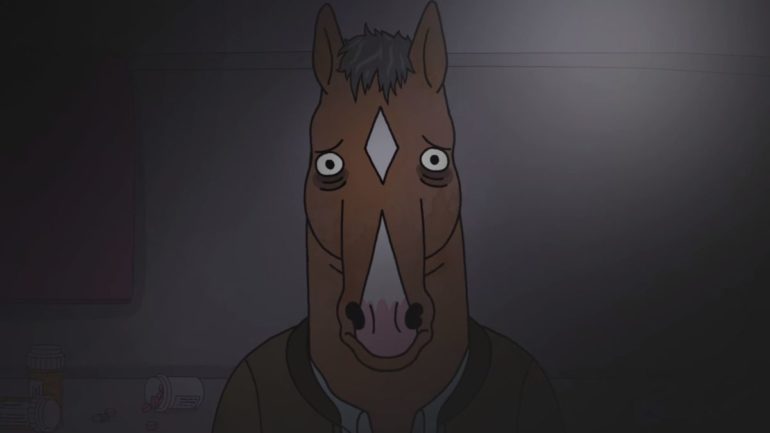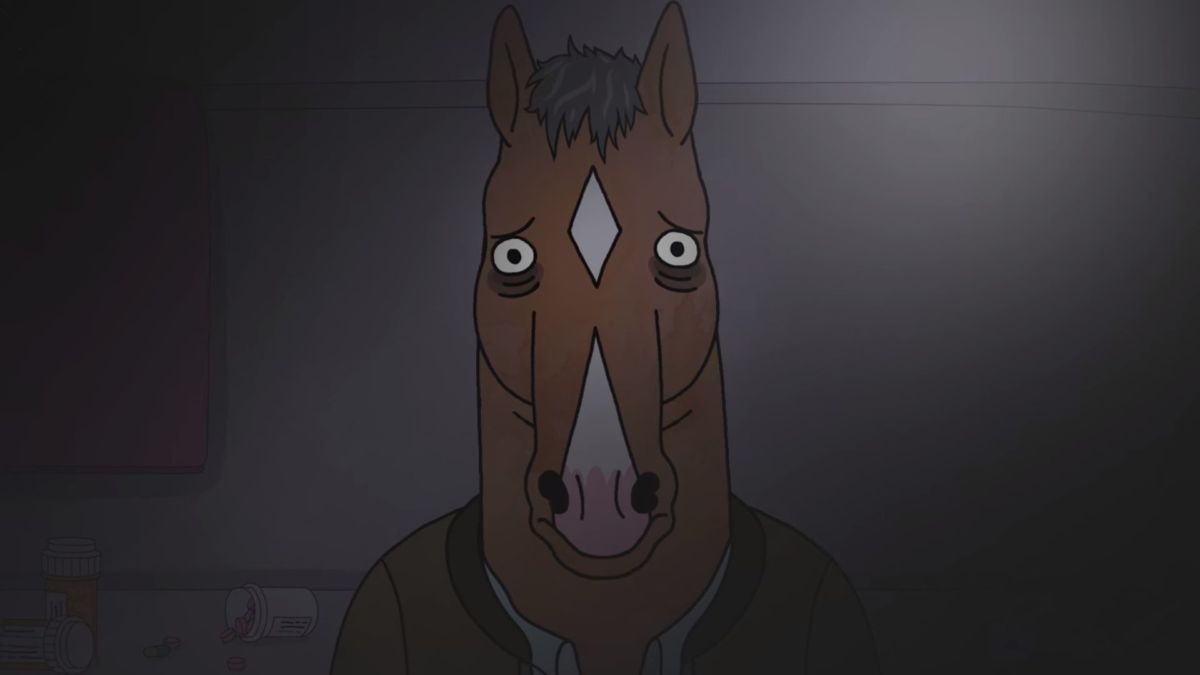“Marge, I’m confused – is this a happy ending or a sad ending?”
“It’s an ending, that’s enough.”
– The Simpsons, ‘Blood Feud’
The last edition of Ricky Garduno’s webcomic 1930s Nightmare Theatre, the final one to go out before Garduno killed himself at a tragically young age, had the protagonists sweltering their way through summer, then enjoying the momentary just-rightness of autumn, then bundled up for winter saying “well, that was good while it lasted”. The last episode of BoJack Horseman is called ‘Nice While It Lasted’. Coincidence? Yes, obviously, but that didn’t stop it from being an uncanny connection on the scale of spotting your dead grandmother on a bus driving the opposite way.
Most TV shows, most works of fiction will try to make themselves identifiable to their audience on some level – hey, this dragon-riding rock star astronaut is just like me! – but BoJack Horseman, and 1930s Nightmare Theatre before it, were always attempting to go beyond merely being identifiable and actually put into words all those bitter, self-hating, toxic thought patterns you find yourself straying into in low moments. While I say ‘attempting’, it’s clearly struck a chord with a good number of viewers. Go on the subreddit and you can find any number of accounts from people saying it helped them come to terms with their own depression – a better day’s work than most cartoonists have ever done.
BoJack himself is, in many ways, another example of the powerful male villain-protagonist, like Tony Soprano and Walter White before him – and there’s a clear likeness to Breaking Bad in that the first half of the final season ended on a moment of obviously false hope that was clearly about to come crashing down. With the Horseman, though, the focus has been shifted slightly onto his internal qualities, and what a certain kind of commentator would call ‘man-pain’ – or, as the less ghoulish of us call it, ‘pain’.
To put it simply, hardened mafia-men having affairs and ruling criminal empires is somewhat more crowd-pleasing than a main character being paralysed with self-hatred. Even the voices who claim to specifically oppose the ubiquity of straight white male-led narratives reserve a special hatred for that sort of thing, hence the scare-mongering we saw around the release of Joker. But, as with Joker, a huge number of people found that BoJack’s damaged, less crime-lordy approach really spoke to them.
The temptation in storytelling is to provide your white hats with a just reward, and your black hats with a suitable comeuppance. This is never stronger than in finales, and due credit to BoJack Horseman for resisting that urge. I might have used the loaded word ‘villain’ to describe BoJack earlier, but from him on down, the characters are too rounded and too complicated to place into simple boxes like that.
The nearest development to any sort of ‘just desserts’ like that is – mild spoiler alert – a moment when a main character attempts suicide. But it’s only made explicit that’s what it was after an entire episode, ‘The View From Halfway Down’, in which the show puts a firm pin in any notion of romanticising the idea of topping yourself. Contrast Netflix’s notorious 13 Reasons Why, so desperately uneven in tone that it actually made its audience want to harm themselves, a rare artistic achievement but not strictly speaking a good one.
While BoJack Horseman has always been good at tailoring its form to match its content, and this season gives an excellent example in the pen-on-paper chaos of ‘Good Damage’, ‘The View From Halfway Down’ is a surprisingly mild example. It’s the kind of allegorical dream sequence that’s been done ever since Christ came up with a decent gimmick for the parables, nobody’s going to get points for originality trotting that out, so the only other option is to do it really well. And that’s what they’ve done. Some allegories might be wary of appearing too indulgent, ‘The View From Halfway Down’ embraces that to the point of making it an ensemble-led variety show. BoJack Horseman may be a story about depressed talking animals, but it’s also media about the media.
The show’s also always been good at balancing the heavier stuff for which it’s so well known with lighter, more straightforwardly comedic material – often provided by Aaron Paul’s Todd. Here the ratio’s become uneven, not least because Todd’s got his own more serious plot to deal with. So they’re left with a bit of a struggle to keep up the other end of things, although it’s no more affected than before: when Todd got a B-plot you could be pretty sure what you were in for.
Speaking of the winner of Mr. Light Comic Relief 2016-2020, though, over the years BoJack Horseman has accumulated a fairly sizeable ensemble cast, including a number of minor characters who became disproportionately beloved by the fanbase, so having to wrap up every storyline simply wasn’t going to happen. Nonetheless, it takes a brave whack at rounding off more stories than you might have expected, even if some of them are in the form of blink-and-you’ll-miss-it background gags (more reliable in these days of streaming), and still, in this eleventh hour, is bringing in new characters and giving them a fair whack.
Something I touched on in my review of the first half of this season was that, even as the rest of the main cast got meaty spotlight episodes, it was still all very clearly revolving around BoJack himself. This back half of the season does, initially, seem to be keeping within that vein, only to pull the rug from under us again as they decisively move into stories of their own. Here at the eleventh hour, though, the show has to move through these wrappings-up with, at best, a brisk pace. Alison Brie’s Diane does alright, but others are reliant on some very sudden plot twists, or find themselves abruptly dropped off a cliff.
After the climactic nature of ‘The View From Halfway Down’, the finale inevitably seems – and it’s good of blockbuster films to have provided this comparison – sort of like a post-credits sequence. By now we all knew it would be there, and as I say it provides an Animal House-style ‘where are they now?’ final note for the main cast, yet it’s disjointed and feels slightly tacked-on to the main body of the season.
The fact this feels so jarring is partly down to the show’s gestures towards realism. It’s always kept its storylines from feeling too much like constructed narratives with beginnings, middles, and ends, while still actually being storylines instead of just a bunch of stuff that happened. This is a tricky fence to walk on at the best of times, and the thing about finales is that you only get one chance at them – unless, you know, another network steps in.
It’s unlikely that’ll happen with BoJack Horseman, though, because despite everything this is clearly an ending, and not one that cries out for more either. The show hasn’t been left in a limbo state like Firefly, shot in the back of the head without warning, or My Name Is Earl, who, knowing they were cancelled, left off on a king-hell cliffhanger and dared the world to say something about it. Creator Raphael Bob-Waksberg has moved on to Undone, and animation studio ShadowMachine will be making Robot Chicken until we finally experience the blessed relief of running out of cultural references.
(Though given how the extended cast grew more prominent over the years, the more likely option would be a spinoff, possibly focused on Princess Carolyn’s one-note but oddly lovable ex-boyfriend Vincent Adultman.)
So there’s no immortal cut to black like The Sopranos, or final confrontation like Breaking Bad, or even a ridiculous glimpse of BoJack having escaped and become a lumberjack like Dexter. Many predicted that it would end with BoJack’s dramatic death, but that would have been the kind of nihilism it never surrendered to – this isn’t a show about neat conclusions and never was. Since it began it’s been fumbling around the vulnerable, raw parts of the human psyche, and it’s still doing that in its final moments. Call this incredibly trite if you must, but in this case, maybe the treasure really was the lessons we learned along the way.
Some of the coverage you find on Cultured Vultures contains affiliate links, which provide us with small commissions based on purchases made from visiting our site.


